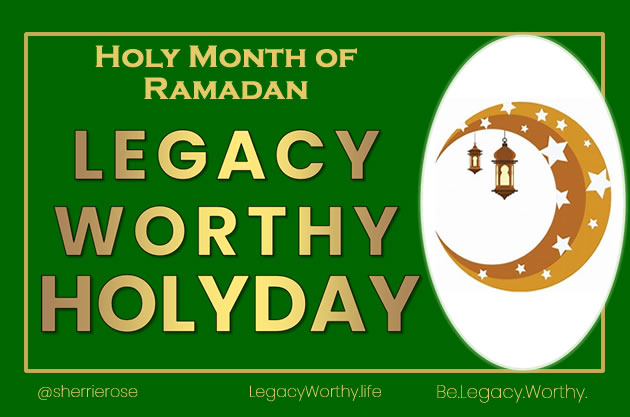Ramadan, The Islamic Holy Month of Fasting

Ramadan, The Islamic Holy Month of Fasting for Muslims
Ramadan is an Islamic holy month of fasting that has been practiced since the 7th century. It’s a time of spiritual purification, sacrifice and self-discipline, where Muslims abstain from food, drink and other physical needs during daylight hours. This period of reflection and devotion is celebrated by almost 2 billion Muslims around the world, making it one of the most widely observed religious rituals in history.
Muslims engaged in these activities during Ramadan, to deepen their connection with God (Allah) and gain a greater sense of peace and clarity about their purpose in life. In this article we will explore the history and traditions associated with this important Islamic holiday so that readers can gain a better understanding of its significance in the Muslim faith.
Ramadan is considered one of the most legacy worthy holidays in the Islamic calendar. It is a holy month that culminates in the celebration of Eid-Al-Fitr, a day of great significance for Muslims worldwide. This observance has been celebrated for centuries and has become an integral part of the Islamic faith, leaving behind a rich legacy of spiritual enrichment.
Ramadan is a time when Muslims observe a month-long fast from dawn to sunset, abstaining from food, drink, and other physical needs. The fast is broken at sunset with a meal called Iftar, and before dawn, another meal called Suhoor is taken. This act of fasting is believed to purify the soul and bring Muslims closer to Allah, allowing them to reflect on their faith and to become more spiritually connected.
The observance of Ramadan has become a legacy worthy tradition, passed down from generation to generation. It is a time when families and communities come together to share meals, prayers, and acts of charity. Ramadan provides a shared experience that unites Muslims across the world, regardless of their background or cultural differences.
As the month of Ramadan progresses, the spiritual and cultural significance of this observance becomes more apparent. It leaves behind a legacy of teachings and traditions that continue to shape the Islamic faith and its followers. The legacy of Ramadan is one of discipline, self-reflection, generosity, and spiritual growth. It is a reminder of the importance of self-control, compassion, and unity, and it continues to inspire generations of Muslims to excellence in their faith and their daily lives.
Ramadan is more than just a time for fasting; it is also a time of prayer, charity and reflection on the teachings of Islam. During this month, Muslims are encouraged to focus on their faith and practice acts of kindness towards others. They are also encouraged to read the Qur’an, attend special prayer services at mosques and give generously to those less fortunate than themselves.
#1 History and Significance of Ramadan
Ramadan is an important month in the Islamic calendar, celebrated by Muslims all over the world. It is a time of spiritual reflection and growth, marked by fasting during daylight hours. The month of Ramadan lasts for 29 or 30 days, depending on the lunar cycle.
The origins of Ramadan can be found in the Quran, which tells believers to fast during the ninth month of the Islamic year. According to tradition, this is when Muhammad first received revelations from Allah through the angel Gabriel. During this time, Muslims abstain from food and drink from sunrise to sunset in order to purify their bodies and minds. They also spend extra time in prayer and recite verses from the Quran throughout the day.
This period of fasting also serves as an opportunity for Muslims to practice self-discipline and restraint. It reminds them of those less fortunate than them who live in poverty or hunger, and encourages generosity towards those in need. Through fasting and dedication to prayer, believers are able to strengthen their relationship with God and deepen their faith in Islam.
Ramadan has become an important part of Muslim culture over many centuries, with families gathering together for nightly meals known as ‘iftar’ at sundown when they can break their fasts together. At its core, Ramadan is about uniting people through shared values and beliefs. As such it remains a powerful symbolic reminder for Muslims around the world that faith transcends all boundaries.
#2 Preparation for Ramadan
Before Ramadan begins, Muslims must prepare for the holy month. Firstly, they should strive to increase their worship and be more mindful of Allah. This includes being more conscious of their speech and actions, as well as increasing their prayers and reading of the Qur’an. Secondly, Muslims should set goals for themselves during Ramadan in order to maximize the spiritual rewards that come with fasting. Examples include praying extra prayers at night, reading additional portions of the Qur’an, or even volunteering in the community. Lastly, it is important to plan ahead to ensure that fasting can be done safely. This includes scheduling meals around work or school hours so that one does not become too weak or fatigued throughout the day. Additionally, Muslims should also make sure that they are getting enough rest each night before beginning a new day of fasting. By properly preparing for Ramadan, one can ensure a successful and meaningful holy month.
#3 Where in the World is Ramadan Observed?
Ramadan is observed in many major cities around the world. Muslims live in almost every country in the world, with the majority residing in Asia and Africa.
As of 2021, it is estimated that there are over two billion Muslims worldwide, making Islam the second-largest religion in the world after Christianity. Some of the major cities in the world with large Muslim populations include:
Istanbul, Turkey – With a population of over 15 million, Istanbul is one of the largest cities in the world and is home to a significant Muslim population.
Jakarta, Indonesia – Jakarta is the capital of Indonesia and has a population of over 10 million, making it one of the most populous cities in the world. It is also home to the largest Muslim population of any city in the world.
Karachi, Pakistan – Karachi is the largest city in Pakistan, with a population of over 14 million. It is home to a significant Muslim population and has a rich Islamic history and heritage.
Cairo, Egypt – Cairo is the capital of Egypt and has a population of over 19 million. It is home to many historic Islamic landmarks and is an important center of Islamic scholarship.
Dhaka, Bangladesh – Dhaka is the capital of Bangladesh and has a population of over 21 million. It is one of the largest cities in the world and is home to a significant Muslim population.
Other major cities with significant Muslim populations include Riyadh, Saudi Arabia; Tehran, Iran; Lagos, Nigeria; and Kuala Lumpur, Malaysia.
#4 Overview of the Islamic Calendar
Ramadan is the ninth month of the Islamic calendar The Islamic calendar is based on the lunar cycle and consists of 12 months. Each month has 29 or 30 days, depending on when the new moon is Ramadan is the ninth month of the Islamic calendar The Islamic calendar is based on the lunar cycle and consists of 12 months. Each month has 29 or 30 days, depending on when the new moon is sighted. The year begins with the sighting of the new moon that marks the beginning of Muharram, the first month of the Islamic calendar. Ramadan, which is considered to be one of the holiest months in Islam, falls during the ninth month of this calendar. It is a time for Muslims to observe fasting and worship Allah for an entire month.
Ramadan is a period of spiritual reflection and devotion to God. During this time, Muslims abstain from food and drink from sunrise to sunset every day for thirty days. This period also includes increased prayer and charity, along with special meals at sunset each night known as “iftar”. It is believed that during Ramadan, Allah reveals his blessings upon believers who are devoted to their faith.
At the end of Ramadan, a three-day celebration called Eid al-Fitr marks its conclusion. During this festival, Muslims gather together to express their gratitude for having successfully completed their fasting period and thank Allah for his many blessings throughout the year.
#5 Social Impact of Ramadan
Ramadan is a time of great spiritual, social and economic significance. Not only does it bring Muslims closer to God, but it also has a profound impact on the societies in which they live. During Ramadan, families come together to share meals and celebrate, while businesses adjust their hours to accommodate those observing the fast. This has a positive impact on communities around the world, uniting people through shared experiences and traditions.
One of the most noticeable impacts of Ramadan is seen in the way that people treat each other and interact with their neighbors. During this holy month, many Muslims take extra care to ensure that they are respectful of one another, leading to an atmosphere of peace and understanding within communities. There is also an emphasis placed on charitable giving during this time, with many Muslims donating money or food to those in need. This helps create a sense of solidarity among members of the community and encourages kindness towards others.
Ramadan can also have an economic effect on certain regions as well. Many businesses adjust their working hours to allow for people observing Ramadan to rest during daylight hours, while others take advantage of increased demand for certain goods or services during this time period. In addition, some countries may even see a boost in tourism due to visitors coming from abroad for religious observances or celebrations during Ramadan. All these factors combine to have a positive impact on local economies and help foster economic growth in certain areas.
#6 Fasting and Rules of Ramadan
During Ramadan, Muslims are expected to observe a strict set of rules and regulations. It is important for Muslims to abstain from any form of food and drink during the daylight hours, from dawn until sunset. Additionally, Muslims should also refrain from engaging in activities that involve physical or verbal harm, such as fighting or gossiping.
Moreover, Muslims must also be mindful of their actions and thoughts throughout the month, striving to remain positive and kind to all those around them. This includes being respectful of one’s elders and being generous with charity throughout Ramadan. Furthermore, it is encouraged that individuals pray more often than usual during Ramadan as an act of worship to Allah.
Ramadan is a special time for Muslims as it provides an opportunity for them to deepen their connection with Allah while reflecting on their lives and how they can become better versions of themselves. It is a period of spiritual renewal which allows individuals to become closer with God and lead a life that honors Him.
#7 Spiritual Aspects of Ramadan
Ramadan is a time for spiritual reflection, prayer, and devotion. During this holy month, Muslims focus on their relationship with Allah and strive to come closer to Him. During Ramadan, Muslims fast from dawn until sunset in order to gain spiritual reward and purify their souls.
The act of fasting also serves as a reminder of the suffering of those less fortunate than ourselves. Through fasting, we are taught to be grateful for our blessings and become more compassionate towards others. This helps Muslims develop humility and encouraging mercy upon others.
In addition to fasting, Muslims spend much of their time during Ramadan reflecting on the Quran and engaging in prayers such as Taraweeh and Dua. These prayers can help strengthen one’s faith and bring them closer to Allah. Ramadan is also an opportunity for Muslims to reconnect with family and friends by attending communal gatherings such as iftar (breaking the fast) or taraweeh (special night prayers).
By observing these practices during Ramadan, Muslims are able to spiritually reconnect with Allah, cultivate compassion for others, deepen their understanding of the Quran, and strengthen relationships with family and friends.
#8 Charitable Giving During Ramadan
After the spiritual aspects of Ramadan, it is important to consider the charitable giving that happens during this holy month. During the time of fasting, Muslims are encouraged to increase their donations and be more generous with those in need. It is believed that charity given during this time is even more rewarding than usual.
Muslims often practice two types of charity during Ramadan: Zakat and Sadaqa. Zakat is a mandatory form of almsgiving, which requires every Muslim to give 2.5% of their accumulated wealth as a donation each year. This money goes towards helping those who are less fortunate in their community, such as the poor or elderly. Sadaqa, on the other hand, is voluntary charity which can take many forms—from donating food or clothing to helping out with someone’s rent or medical bills.
Charitable giving help those in need within one’s own community, serves as a reminder for Muslims to be mindful of their actions throughout the month of Ramadan and beyond. Charitable giving can serve as a reminder for all people to think about how they can better serve others in our society and become more compassionate beings overall.
#9 Cultural Observances during Ramadan
Ramadan is the holiest month for Muslims around the world, and it is observed in many different ways. During this time, Muslims practice fasting, prayer, charity and reflection. One of the most important cultural observances during Ramadan is fasting from sunrise to sunset. During this time, Muslims abstain from eating or drinking anything and are encouraged to focus on spiritual pursuits.
Another important cultural observance during Ramadan is nightly prayer. Muslims gather at mosques to say their prayers together in congregation and seek forgiveness from Allah. Additionally, they also recite passages from the Quran and share stories about Prophet Muhammad (peace be upon him).
Charity is also an important part of Ramadan. Muslims donate money or food to those in need and help those who are less fortunate than them. This shows that they care not only for their own spiritual well-being but also for the well-being of others. In addition to charity, people often spend time with family members during Ramadan as a way to strengthen relationships and build bridges between communities.
Ramadan is a special time full of reflection, prayer and acts of kindness that bring people closer together spiritually and culturally. It serves as a reminder to be grateful for our blessings and give generously to those who are less fortunate.
Ramadan is a sacred time of year for Muslims that holds deep meaning and importance in their faith and culture.
Ramadan is an all-important period of spiritual practice and celebration for Muslims around the world. It culminates in the legacy-worthy holy day of Eid-Al-Fitr, a joyous festival that has been observed for generations. This holy month is a time for reflection and connection with faith, providing a legacy of spiritual enrichment.
#10 The Holy Month and Holy Day of Eid-Al-Fitr
At the end of Ramadan, Muslims celebrate Eid-al-Fitr, which marks the end of fasting. It is a joyous celebration that begins with prayers and is followed by three days of festivities. Friends and family members gather to share meals, exchange gifts, and enjoy each other’s company.
The festivities serve as a reminder of Allah’s mercy and grace. They also emphasize the importance of charity in Islam; Muslims often give food to those who are less fortunate in order to benefit from Allah’s blessings. Furthermore, Eid serves as a reminder that although we face hardship during Ramadan, there will be reward waiting at its conclusion.
Eid-al-Fitr is an occasion to reflect on one’s spiritual journey during Ramadan. Muslims reflect on the lessons they have learned while fasting and strive to apply them throughout the rest of their lives. Through this holy occasion, they are reminded that goodness can come from even the most difficult experiences when you put your faith in Allah.
#11 The Holy Month ending in the Holy Day of Eid Al-Adha
Celebrating the Festival of Sacrifice (Eid Al-Adha)
At the end of Ramadan, Muslims around the world celebrate Eid al-Adha. This is a four-day festival that honors Abraham’s willingness to sacrifice his son out of obedience to God. During this time, Muslims are encouraged to dress in their best clothing, visit with family and friends, give charity, and pray and thank Allah for all they have been blessed with.
On the morning of Eid al-Adha, Muslims attend special prayer services at mosques or other places of worship. These services involve reciting verses from the Quran and giving thanks to Allah for his blessings. Afterward, families gather together for a meal and exchange gifts.
In some Muslim countries, animal sacrifice is part of the celebration of Eid al-Adha. People purchase an animal such as a goat or sheep, which is then slaughtered in accordance with Islamic law. The meat from the sacrificed animal is then shared among family members and those in need. This ritual is meant to remind people of Abraham’s willingness to sacrifice his son out of obedience to God (Allah) and serves as an example of dedication to faith despite obstacles.
Eid al-Adha stands as a reminder that through faithfulness and obedience we can receive blessings from Allah no matter what challenges come our way. By celebrating this holiday every year, Muslims around the world honor Abraham’s commitment to God while also enjoying time with their families and giving back to those less fortunate than them.
Ramadan is an important time in the Islamic calendar and is celebrated every year by Muslims all over the world. It’s a time of reflection, prayer, and fasting that has both social and spiritual significance. During this period, it’s important to follow the guidelines and regulations set out by Islamic teachings. This includes abstaining from food and drink during daylight hours as well as performing acts of charity.
At the end of Ramadan, there is a great celebration called Eid-al-Fitr where family and friends come together to celebrate with special meals and gifts. Additionally, many Muslims choose to travel while observing Ramadan so they can experience different cultures while still honoring their own traditions. Finally, Eid al-Adha marks the end of the Hajj pilgrimage and is celebrated with feasting and exchanging gifts.
Ramadan is a time for spiritual renewal that provides an opportunity for Muslims to reflect on our values and strengthen our connection with God.



